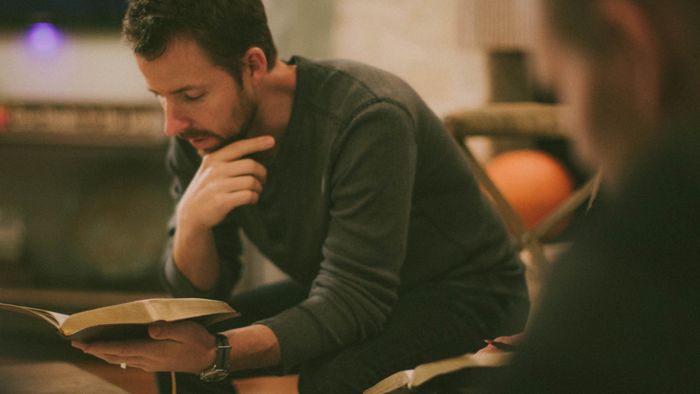At Sovereign Hope we are intentionally taking two years to focus on the issue of discipleship. There are few words in the Christian vernacular as vague, or as broad, as discipleship. On one end we can approach it too informally and think that by simply being relational creatures we are doing the business of "discipling." On the other end, we can over structure discipleship into a five tier strategy to engage three types of people over the course of four months, in order to produce six key points of gospel understanding and two points of visible life transformation. I myself have pitched tent in both camps and felt disappointment with brief success in each. But in order to do discipleship well as a church, I think we need to grasp first a better understanding of what discipleship is and from that we can discuss what it looks like.
Discipleship is a big topic. And an important one. But I promise you, you can do it.
A Two-fold Vision
Disciples are by nature followers; they follow someone, or something. When Jesus called James and John he didn't call disciples, he called fishermen. Jesus made them disciples. Jesus' first method of discipleship was evangelistic by nature. In Matthew 4:18-22, we see Jesus calling his first disciples; and in the following verses we see Jesus taking them with him as he proclaimed to them (and others)"the gospel of the kingdom" (Matt 4:23). This is the first aspect of discipleship: we need to make disciples. When evangelism is done on top of a preexisting relationship, it naturally takes a form of discipleship. When dealing with a non-Christian, evangelism is the message but discipleship is the method.
Conversion is the assumption of discipleship. From that point forward we can begin to do discipleship type stuff (because now they are following Jesus, hence being "disciples"). Going back to Matthew 4, I love the flow of progress. Jesus entered into relationship with his people; he proclaimed to them the gospel, and then he applied the gospel to their lives (Matthew 5-7). The Sermon on the Mount gets to the heart of discipling; it inserts the good news of the gospel into the lives of those who believe. Where disciple making (evangelism) reveals the need for the gospel, discipling revels in the depth of it.
Definition in Progress
When I work with college leaders at Grizzly Christian Fellowship, I offer up a rough, semi-technical, definition of discipleship. While it is still a work in progress, I think it could be helpful when it comes to defining what discipleship is and what it isn't. Seeing the two-fold use described above, discipleship is then an intentionally didactic life of the cross.
Intentionally didactic
Didactic means, "intended to teach." In one sense we all teach, all the time. My two year old son has begun to model my behaviors and language. Just the other day when we were driving to church my wife remembered she had forgot something at home and offered an audible, frustrated, "Shoot!" From the backseat Owen replied, "What did you forget Mommy?" Sarah and I have had very few formal discussions with our son on what he should be learning, but he is learning because our lives are didactic. The emphasis in discipleship is that we are intentionally didactic. We don't leave a vacuum. We desire to influence every conversation and decision with the power of the gospel. J.C Ryle put it best, "A Christian is a walking sermon. They preach far more than a minister does, for they preach all week long."
Life of the Cross
In my mind you must be intentionally didactic to disciple well, but there is also great freedom in what and how you exercise that influence. The phrase "life of the cross" is vague because it is intended to be very broad. It is partially influenced by Martin Luther's "theology of glory" versus a "theology of the cross." In Luther's mind there are two types of theology, and everyone falls into one or the other. The first group, "theology of glory," is filled with people who lack glory and have set out to find power/purpose/identity on their own for their own benefit. But those who subscribe to the "theology of the cross" are ones who realize they already have storehouses of glory and beauty in the person and work of Christ.
When teaching the life of the cross we are simply taking the idea that we have been redeemed, reconciled and resolved by the cross; pressing it into our lives and conversations. This is living our lives in the manner for which we were saved while simultaneously testifying to the way in which we were saved: the gospel. Living an intentionally didactic life of the cross means we want to talk about how the gospel shapes our relationships, job choices, sin struggles, finances, aspirations, schedules, fears and anxieties.
Pump the Brakes
In order to do this well you do not need to be a varsity Christian. You do not need to have a degree from a Bible School or seminary. You do not need to have a systematic theology book memorized (although it is helpful to know where one is). You do not need to be sinless. You don't even need to have all the answers. You just have to have the right hope.
In Ephesians 1, Paul is providing a wonderful prayer for the church in Ephesus. I think he nails the prayer of a disciple in verses 17-18. He prays, "that the God of our Lord Jesus Christ, the Father of glory, may give you the Spirit of wisdom and of revelation in the knowledge of him, having the eyes of your hearts enlightened, that you may know what is the hope to which he has called you, what are the riches of his glorious inheritance in the saints." At the heart of discipleship is the hope of the gospel. By it we have been changed, through it we will be changed, and under it we live this side of the grave.
Discipleship is really reminding people of this hope. This is for your own good, and for the good of the other person in the discipleship relationship. Discipleship forces us to wrestle with the practicality of the gospel together. Mike Bullmore recently summed it up well when he said, "Fundamentally discipleship is an act of love not an act of skill."
Putting it Into Practice
Why should we care about discipleship? Two reasons: 1. Because we love people and we want them (and us) to be changed by Christ, 2. Because Jesus has commissioned his church to make disciples. Here are some helpful practices that can jump start your discipleship.
Find Someone
They could be Non-Christian (but note there will be a uniquely evangelistic distinction here), or Christian in your community group, in your class, or a friend from church.
Set a Schedule
We aren't looking to overwhelm them. But it is helpful to say something like, "Hey, want to grab coffee with me every other week until summer starts?" There is nothing wrong with starting out on a bi-monthly or monthly basis.
Have a Plan
There is a lot of freedom here. I have known some people who have gone through a curriculum (talk to your pastor if you are looking for a good place to start). Others like to do a more inductive type Bible study. But there are also other ways to do this so long as you understand discipleship is an intentionally didactic life of the cross. You can set up a meeting with a friend after church to just discuss what stood out from the sermon, or what challenged you. Students can have a weekly lunch where you ask your partner how they are doing in their devotions/worship (and vice versa). Moms can set up play dates where they press a gospel grid onto their parenting to see what comes out. Read a good Christian book together, take notes and sync up once a month. Set a reoccurring movie night but at the end discuss how the movie matches up with the gospel, and what it says about hope/humanity, etc. Find a good sermon series or podcast and get listen to it together.
Don't forget to enjoy this process. Through discipleship we can wrestle with sin, burdens and trials in the Christian life. But we ought not forget that we are doing it together, for God's glory, the good of the individual, and the health of the church.




